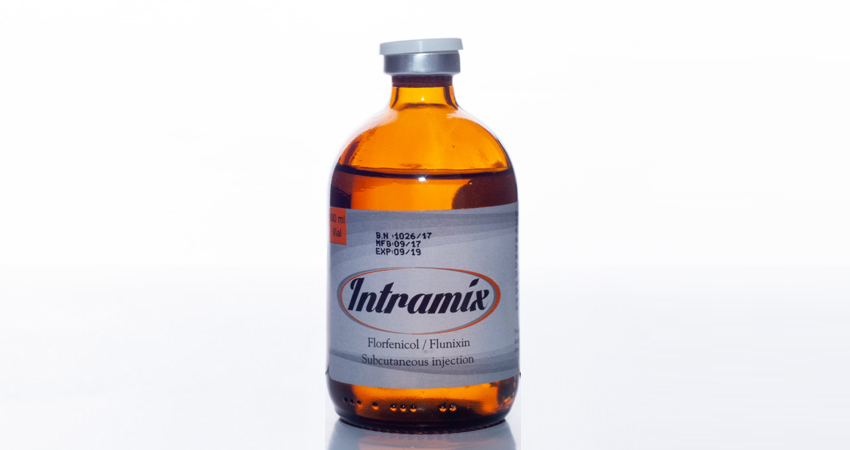Composition
Each ml contains:
Florfenicol 300.0 mg
Flunixin meglumine 27.4 mg
(Equivalent to 16.5 mg/ml Flunixin base)
Properties
- Therapeutic Group: Florfenicol :Antimicrobial , Flunixin Meglumine: anti-inflammatory drug
- Therapeutic Class: Florfenicol :is a fluorinated analogue of chloramphenicol, Flunixin Meglumine is NSAIDs
- Mode of Action:
- Florfenicol is a synthetic broad spectrum antibiotic effective against most Gram-positive and Gram-negative bacteria involved in bovine respiratory disease which include Mannheimia haemolytica, Pasteurella multocida and Histophilus somni.Florfenicol acts by inhibiting bacterial protein synthesis at the ribosomal level and is bacteriostatic.
- Flunixin meglumine is a non-steroidal anti- inflammatory drug with analgesic and antipyretic activity. Flunixin meglumine acts as a reversible non-selective inhibitor of cyclo-oxygenase (both COX 1 and COX 2 forms), Flunixin exerts its antipyretic effect by inhibiting prostaglandin E2 synthesis in the hypothalamus.
Indications
Curative treatment of respiratory infections (pneumonia) caused by Mannheimia haemolytica, Pasteurella multocida & Histophilus somni associated with pyrexia.
Target species
Beef and non-lactating dairy cattle only
Warnings & Precautions
- The product should be used in conjunction with susceptibility testing and take into account official and local antimicrobial policies.
- Swab septum before removing each dose. Use a dry sterile needle and syringe.
- Avoid use in dehydrated, hypovolaemic or hypotensive animals as there is a potential risk of increased renal toxicity.
- Concurrent administration of potentially nephrotoxic drugs should be avoided.
- Care should be taken to avoid accidental self- injection.
- Wash hands after use.
- Dose volume given at any one injection site should not exceed 10ml.
- It is recommended to treat animals in the early stages of the disease and to evaluate the response to treatment 48 hours after injection.
- flunixin, may mask a poor bacteriological response to florfenicol in the first 24 hours after injection.
- Concomitant use of other NSAIDs or glucocorticosteroids with Intramix may result in gastrointestinal tract ulceration
Contra-indications
- Do not use in adult bulls intended for breeding purposes.
- Do not use in animals suffering from hepatic and renal diseases.
- Do not use if there is a risk of gastrointestinal bleeding or in cases where there is evidence of altered hemostasis.
- Do not use in animals suffering from cardiac diseases.
- Do not use in animals hypersensitive to the product.
- Do not administer to animals less than 6 weeks of age.
- Do not use in female dairy cattle 20 months of age or older. Use of florfenicol in this class of cattle may cause milk residues.
- Do not use in calves to be processed for veal.
Adverse reactions
Normal Dose :
Swelling at the site of injection.
Overdose :
Symptoms include: Decreased food consumption , decreased body weights, decreased water consumption, Tissue irritation increases with injection volume
Dosage and administration
- Route of administration: Subcutaneous injection. The injection should only be given in the neck
- Whole Product: (2 ml Intramix/15 kg body weight) or (6 mL/100 lb)
Withdrawal periods
- Meat and offal: 46 days.
- Milk: In the absence of a withdrawal time in respect of milk, do not use in females producing milk for consumption, during lactation or drying off periods, nor in the 2 months preceding calving in animals to be used for producing milk for consumption in the future
Storage Conditions
Store at temperature not exceeding 30°C and used after opening for 50 days at temperature not exceeding 30°C.
Packaging
Glass vials : 50 , 100 , 250 & 500 ml

